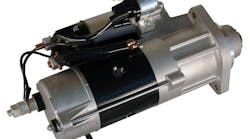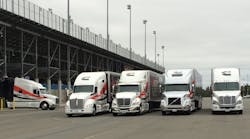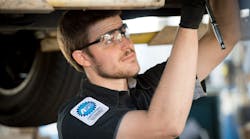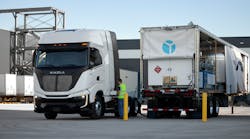In today’s increasingly competitive trucking environment, fleets are more and more focused on total cost of ownership (TCO). TCO refers to determining the complete cost of operating a vehicle, from purchase to disposal. It adds to the initial purchase price other costs that are expected to be incurred during the life of the vehicle, such as service, repair, downtime and vehicle re-sale values.
A direct path to improved TCO is twofold:
- Using components that provide long-life.
- Reducing fuel consumption and lowering operating expense.
What this means for suppliers is the need to understand the marketplace in order to gain strategic insight and direction, work to develop new and better technologies and products and integrate them with other components in a systems/modular environment.
The high expectations from fleets regarding TCO means suppliers must reach a point with components and systems, and the warranties that go with them, where they are engineered to last as long as fleets own their trucks – typically four to five years in the case of heavy duty commercial vehicles.
Truck engines are one of the highest costs of truck ownership.
ALTERNATOR ALTERNATIVES
Alternators typically siphon horsepower off the engine, requiring the engine to use more fuel to compensate. What this means is that the less horsepower an alternator requires, the more efficient it is and the less fuel a truck consumes.
To illustrate, assume two alternators that both produce 200 amps of output. One is 65 percent efficient at road speed; one is 70 percent efficient. The higher efficiency (70 percent) alternator will cause the truck to get better fuel mileage than the other one because it needs less fuel to produce the same amount of output.
In terms of lifecycle, alternators with B10 Life certifications of up to one million miles are available today. B10 Life is an industry standard for measuring the amount of time by which 10 percent of the product population will have failed.
The B10 certification means up to 90 percent of corresponding alternators will still be on the road after the truck reaches a million miles.
Alternators also must be able to withstand the high-heat environments seen in today’s trucks so they can have a long, productive life. Not an easy task when the other part of the equation is that suppliers must keep in mind the need and advantages of a smaller footprint and lighter weight, which contributes to better performance and reduced fuel consumption.
Add to this the trend toward increased hotel loads for more electricity in the vehicle and it leads to alternators that can help batteries provide more capacity and re-charge more quickly.
The industry has stepped up its game with alternators with 160 amps, 200 amps and more, so drivers can run refrigerators, televisions and their computers in the trucks.
Clearly, the challenges being put on alternator manufacturers is sizable, but not insurmountable, for true industry leaders.
STARTERS
With starters for commercial vehicles, such as the ones MEAA produces, the technology has had to advance to the point where today’s starters are meeting the need for longer life with longer warranties. Ours, for example, is three years, and we are experiencing failure rates of less than 0.5 percent.
Starters also play a significant role in helping improve battery life through advancements that provide greater thermal durability, lower current draw, greater cranking torques, shorter cranking cycle times and improved corrosion resistance. Again, exceptional value for our customers, but the challenge is for suppliers to have a clear line of sight to where the market is heading so we can stay ahead.
As leaders in the development of starters and alternators for the truck market, we are at the forefront of investing in and advancing these technologies, and are providing long-lasting products that reduce fuel expenses – all of which works toward better TCO.
But, like other suppliers, we are always looking for continued improvements and advanced developments. As we look to the future to improve TCO, we see and are working on technologies such as idle/stop/start (ISS) for commercial vehicles. This technology, which has its roots in the automotive arena, shows great promise in terms of providing fuel reduction and value for our fleet customers.
The bottom line: The goals of improved TCO, achieving longer product life and reduced fuel consumption are moving targets and companies must have the vision, resources and inclination to answer the call.
David Stone serves as the executive director of powertrain, body and chassis, heavy duty group, for Mitsubishi Electric Automotive America (www.meaa-mea.com). The company is a leading manufacturer and supplier of powertrain, body and chassis products, and in-vehicle entertainment and navigation systems.



